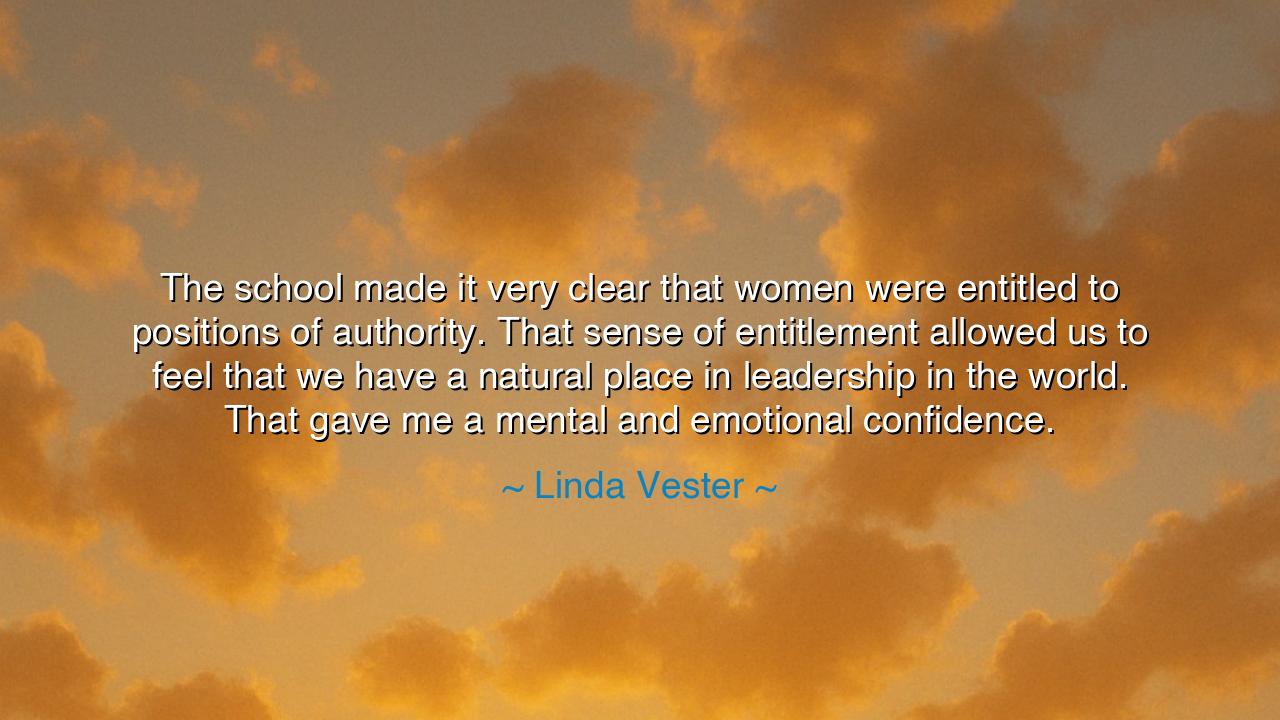
The school made it very clear that women were entitled to
The school made it very clear that women were entitled to positions of authority. That sense of entitlement allowed us to feel that we have a natural place in leadership in the world. That gave me a mental and emotional confidence.






Hear, O seekers of truth and dignity, the words of Linda Vester, who declared: “The school made it very clear that women were entitled to positions of authority. That sense of entitlement allowed us to feel that we have a natural place in leadership in the world. That gave me a mental and emotional confidence.” In this testimony lies not only the memory of one woman’s awakening, but also the echo of a timeless struggle: the long and arduous journey of women toward recognition, respect, and rightful power.
For centuries, authority was thought the birthright of men, while women were told their place was silence, their sphere limited, their influence confined to shadows. Yet when institutions such as schools declared otherwise—when they proclaimed that women too were rightful heirs to leadership—a great chain was broken. Vester speaks of entitlement, not as arrogance, but as a sacred recognition: the rightful assurance that women possess the same natural claim to lead, to govern, to shape the world, as any man.
Consider the tale of Elizabeth I of England, who in an age hostile to female rulers declared herself not only fit to govern but chosen to do so. She spoke with the steel of confidence, saying she had “the heart and stomach of a king.” She ruled for decades with wisdom and force, guiding her nation through storm and struggle. What she possessed was not merely talent, but also the sense of entitlement to stand in her place without apology. Her reign reveals the truth in Vester’s words: when women are taught that their presence in power is natural, they rise without hesitation.
And so too in more recent times, we see the example of Marie Curie, who pursued science in a world that told women to remain in the domestic sphere. She claimed her seat at the table of discovery, not as an intruder, but as one entitled by brilliance and labor. Her double Nobel Prize testifies to the power of such confidence—the strength that emerges when women believe, with unshakable certainty, that they belong in places of authority.
The meaning of Linda Vester’s words is thus both personal and universal: education that affirms equality does not merely train the mind; it liberates the soul. It tells young women that their leadership is not an accident, nor a concession, but a natural right. Such teaching creates within them a fortress of confidence, guarding them against the storms of doubt and the whispers of prejudice. Without this foundation, even the most gifted may falter; with it, even the ordinary may rise to greatness.
The lesson, O listener, is clear: if we wish for a world of balance and justice, then our schools, our families, and our societies must proclaim loudly that authority and leadership are not bound by gender. We must raise daughters who know, from the first days of learning, that their voices matter, their judgment counts, and their presence in leadership is natural, not exceptional. For when this seed is planted early, it grows into unshakable conviction, and conviction bears the fruit of courage.
Practical action lies before us all: teach young women to lead, and young men to honor that leadership. Support institutions that foster equality. Speak against voices that diminish or belittle the presence of women in power. And in your own life, if you are a woman, walk with the confidence of entitlement, knowing that your place in leadership is no less natural than the sunrise; and if you are a man, become not a gatekeeper but a builder of gates flung wide.
Thus let Linda Vester’s words be a beacon: leadership is not the inheritance of one gender but the calling of all who are capable. When women are told and shown that they belong in positions of authority, the world itself grows stronger, for it is enriched by the fullness of human potential. This, O listener, is the victory born of confidence, and the wisdom that must be carried forward through the generations.






AAdministratorAdministrator
Welcome, honored guests. Please leave a comment, we will respond soon